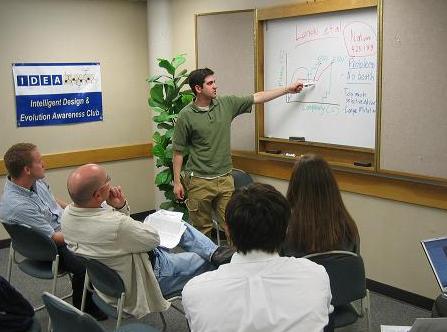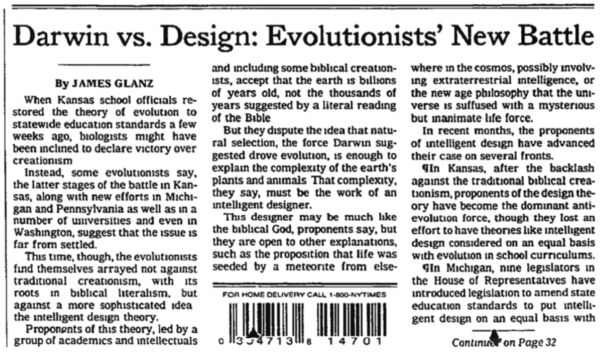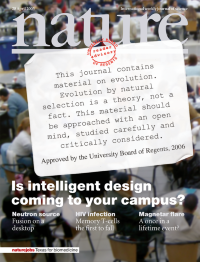IDEA Clubs
The Intelligent Design and Evolution Awareness (IDEA) Clubs represent a global network of primarily student-led extracurricular clubs which help teach people about the evidence regarding intelligent design (ID) and evolution. IDEA Clubs typically exist on university or high school campuses, but they can also exist within other community settings.
Science education today is often dogmatic and fails to inform students about scientific evidence that challenges the standard evolutionary view of life. IDEA Clubs help fill this educational gap and are uniquely poised to reach students who otherwise might never learn about the large body of scientific evidence that supports ID and challenges neo-Darwinian evolution.
History of the IDEA Clubs

In the late 1990s, a group of undergraduates at the University of California, San Diego (UCSD) noticed that the evidence taught in their science classes failed to support the evolutionary model. Filled with intellectual questions, these students began to investigate a new scientific theory of origins — intelligent design. The more they learned, the more they became concerned that the scientific evidence challenging neo-Darwinism or supporting ID was virtually never discussed in their science classes. So, they decided to do something about it.
In 1999, after a lecture on the UCSD campus by UC Berkeley law professor Phillip Johnson, who had written widely-acclaimed books critiquing neo-Darwinism, some students founded the first IDEA Club. They hosted weekly discussion meetings, several successful lectures, and other campus-wide events to educate their friends and colleagues about the evidence for design.

The primary founder of the first IDEA Club was Casey Luskin, now Associate Director of Discovery Institute’s Center for Science and Culture. In April 2001, the UCSD IDEA Club made a Sunday New York Times cover story about intelligent design, which noted that “the movement has spawned at least one university student organization — called the Intelligent Design and Evolution Awareness, or the IDEA club — at the University of California in San Diego.”
This media coverage sparked nationwide interest among students elsewhere who wanted to start an IDEA Club. Later that year, Luskin and other IDEA Club members co-founded the IDEA Center which became a 501(c)(3) non-profit helping students successfully form and run IDEA Clubs on their own campuses.
Making a Worldwide Impact
Since the founding of the IDEA Center in 2001, IDEA Clubs have helped reach thousands of students worldwide to educate them about the evidence for design. Over 50 IDEA Clubs have been formed on campuses spanning four continents, including universities such as Cornell, Stanford, Vanderbilt, UC Berkeley, UC San Diego, University of Oklahoma, George Mason University, University of Texas (Dallas), and the University of Virginia. At Cornell University, IDEA Clubs helped spark the first major intelligent design course taught within a secular university biology department.
IDEA Clubs have also gained notoriety through media coverage in venues such as The New York Times, The Chicago Tribune, The New Yorker, NPR, New Scientist, and the world’s top scientific journal, Nature. In April 2005, IDEA Clubs made the cover story of Nature when it reported on the debate over intelligent design in the academic world. The article stated:
“Students are in the challenge-authority mode at that time in their life, and I think they’re intrigued,” says Stephen Meyer, director of the Center for Science and Culture at the Discovery Institute, the nation’s largest intelligent-design think-tank in Seattle, Washington. Since the first IDEA club began at the University of California, San Diego, in 1999, more than 20 chapters have opened on college campuses around the country. In addition, a small number of academics have begun to offer courses on intelligent design. […]
From the very beginning, the purpose of Intelligent Design and Evolution Awareness (IDEA) clubs has been to facilitate debate, says Casey Luskin, who founded the first IDEA club at the University of California, San Diego, in 1999.
“We want to inform everyone about all sides of the issue, so we actually invite Darwinists to the clubs to talk about natural selection,” says Luskin, who now runs the IDEA Center, a small non-profit organization in San Diego that helps set up new groups on US campuses.
Brumfiel, G. “Who has designs on your students’ minds?“. Nature 434, 1062–1065 (2005).
The IDEA Philosophy
Central to the success of IDEA Clubs has been the IDEA philosophy which holds that everyone should be treated with respect and courtesy regardless of their viewpoint. While IDEA Clubs exist to promote awareness about the evidence supporting intelligent design, anyone is welcome to participate at their activities. As the original IDEA Club mission statement held, they seek “To facilitate discussion, debate, and dialogue concerning these issues in a warm, friendly, and open atmosphere where individuals feel free to speak their personal views.”
From Grassroots to Roots
Founded and spearheaded largely by students, IDEA Clubs and the IDEA Center came from a grassroots movement that wanted to explore the truth about origins. Thus, when Discovery Institute launched the Roots program in 2022 to empower activists who wanted to educate people about ID, IDEA and Roots seemed like a natural fit.
At the beginning of 2023, administration and support for IDEA Clubs were transferred from the IDEA Center to Roots. For more information about starting an IDEA Club, click here.
